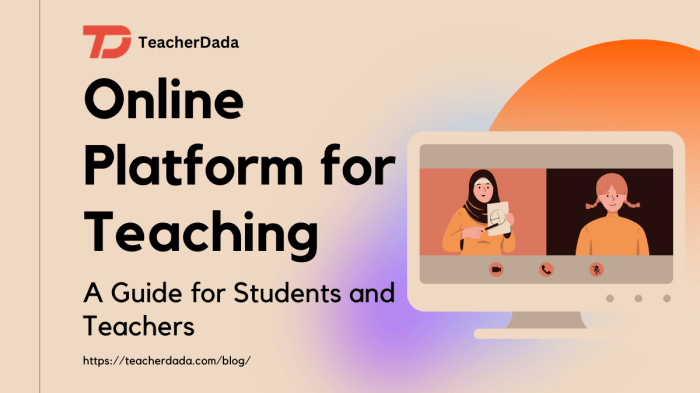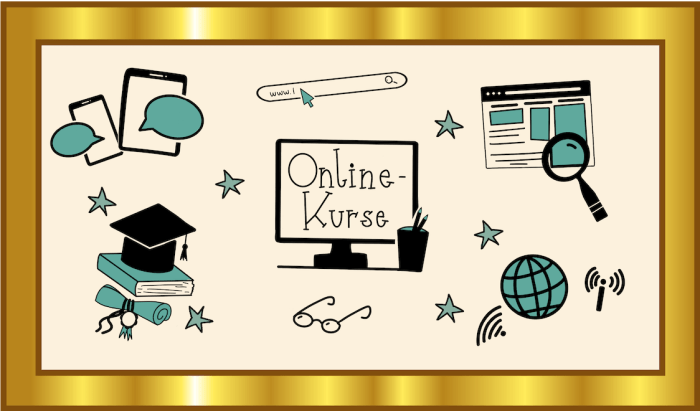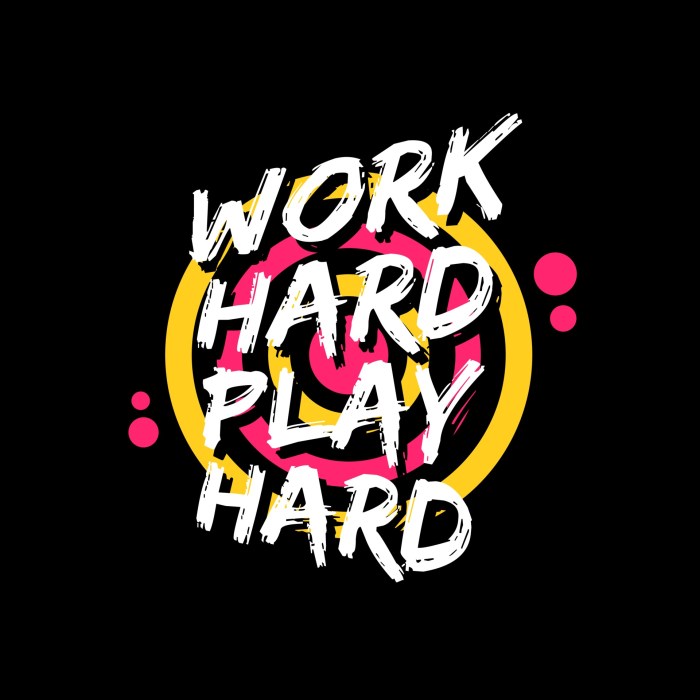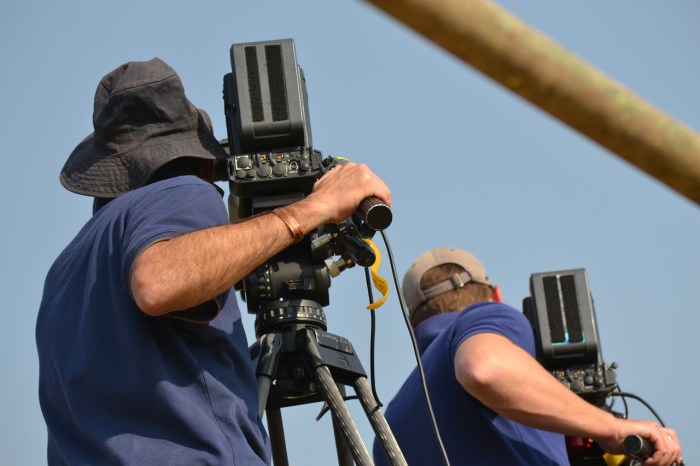Online movie making course provides a comprehensive and accessible pathway to learning the art of filmmaking. This dynamic course covers everything from foundational principles to advanced techniques, catering to diverse skill levels and learning styles. The course structure is carefully designed to maximize your learning experience and equip you with the essential skills to bring your cinematic visions to life.
This detailed guide explores the various facets of online movie making courses, from curriculum and resources to pricing models and student success stories. Discover how these courses can provide a flexible and cost-effective alternative to traditional film schools, empowering you to pursue your filmmaking aspirations.
Introduction to Online Movie Making Courses

Online movie making courses have exploded in popularity, offering aspiring filmmakers a flexible and accessible path to learning the craft. These courses cater to diverse skill levels, from absolute beginners to seasoned professionals looking to hone their skills. The convenience of online learning allows students to study at their own pace and from anywhere with an internet connection.Online courses provide a structured learning environment that can effectively teach the fundamentals of filmmaking.
This allows students to progress from basic concepts to complex techniques, all while receiving feedback and support from instructors. This self-paced format makes it ideal for individuals seeking to enhance their cinematic skills.
Types of Online Movie Making Courses
Various types of online movie making courses are available, each with its own focus and approach. Some courses concentrate on specific aspects of filmmaking, such as cinematography, editing, or screenwriting. Others offer a comprehensive overview of the entire filmmaking process, covering all stages from pre-production to post-production. This allows students to develop a holistic understanding of the industry.
Skill Levels Catered to
Online movie making courses are designed to accommodate learners of different skill levels. Beginner courses provide a foundational understanding of filmmaking principles, equipment, and software. Intermediate courses build upon these basics, delving deeper into specific techniques and advanced concepts. Advanced courses focus on specialized topics, offering opportunities for experienced filmmakers to refine their craft or explore niche areas. This approach caters to a wide spectrum of learning needs.
Course Structure and Duration
The structure of online movie making courses typically involves video lectures, practical exercises, and interactive discussions. Course duration varies significantly depending on the scope and depth of the program. Beginner courses might last a few weeks, while more advanced programs can span several months or even a year. This flexibility allows students to dedicate the time required to fully grasp the material.
Learning Methodologies
Online movie making courses employ a range of learning methodologies to enhance student engagement and understanding. Video tutorials provide clear explanations and demonstrations of key concepts and techniques. Practical exercises, such as short film projects, allow students to apply their knowledge in a real-world context. Interactive forums and Q&A sessions facilitate communication between students and instructors, fostering a collaborative learning environment.
This diverse approach ensures effective knowledge transfer.
Comparison of Course Platforms
| Platform | Course Quality | Pricing | Student Reviews |
|---|---|---|---|
| Udemy | Generally good, but quality varies widely depending on the instructor. Many courses offer a good introduction to topics. | Typically affordable, with a wide range of prices. | Mixed reviews, with some users reporting excellent instructors and courses, while others have had negative experiences. |
| Skillshare | High-quality courses with a strong focus on practical application and community engagement. | More expensive than Udemy, but often includes access to other resources and projects. | Generally positive reviews highlighting the value and engagement of the platform. |
| Coursera | Excellent course quality, often offered by universities and renowned institutions. Courses tend to be more structured and rigorous. | Pricing varies based on the specific course, sometimes requiring a subscription fee. | High ratings for course quality and credibility. Reviews frequently mention the prestige of the instructors and the depth of the material. |
This table provides a brief overview of three popular online learning platforms. It highlights key aspects, such as course quality, pricing, and student feedback, allowing prospective students to make informed decisions about their learning journey.
Course Content and Curriculum
Online movie making courses offer a comprehensive learning journey, empowering aspiring filmmakers with the knowledge and skills needed to bring their creative visions to life. These courses typically cover a broad spectrum of filmmaking techniques, from scriptwriting and pre-production to filming, editing, and post-production. They cater to diverse learning styles and skill levels, providing a supportive and engaging environment for students to develop their unique filmmaking voices.This section delves into the core curriculum, outlining the key topics, core competencies, and pedagogical approaches employed in online movie making courses.
It also emphasizes the critical role of practical exercises and projects in fostering hands-on learning and skill development.
Key Topics Covered
Online movie making courses typically encompass a range of topics, ensuring a holistic understanding of the filmmaking process. These topics build upon each other, progressing from foundational concepts to more advanced techniques. The sequence allows students to grasp the interconnectedness of each stage, from initial ideation to the final polished product.
- Scriptwriting: Fundamentals of screenwriting, including plot development, character creation, dialogue, and scene structure are typically covered. Students learn to translate stories into compelling scripts that engage the audience.
- Pre-production: This stage involves planning and organizing the production, including budgeting, scheduling, location scouting, casting, and crew management. Courses often emphasize the importance of meticulous preparation for a smooth and efficient production process.
- Filming: Techniques for capturing high-quality footage are explored, encompassing camera operation, lighting, composition, and basic cinematography principles. Students learn to translate their creative vision into visual storytelling through effective use of the camera.
- Editing: Essential post-production techniques such as video editing software, cutting, transitions, and color grading are taught. Students learn to refine the footage, assemble scenes, and enhance the narrative flow.
- Sound Design: The importance of sound in filmmaking is highlighted, including audio recording, mixing, and sound effects. Students gain practical experience in creating immersive and engaging audio environments.
- Post-Production: This stage includes all the processes following filming, including color correction, sound mixing, and visual effects (if applicable). Courses cover the use of professional software and tools for achieving the desired aesthetic and technical quality.
Core Competencies Taught
The core competencies in online movie making courses go beyond simply learning software and tools. They aim to cultivate a deep understanding of the filmmaking process and develop practical skills in each stage.
- Scriptwriting: Students learn to develop compelling narratives, craft engaging characters, and structure stories effectively. This includes techniques for dialogue writing and scene building.
- Filming: Practical skills in camera operation, lighting, and composition are taught. Students learn to utilize these techniques to effectively capture visual elements of their stories.
- Editing: Students are taught to use professional video editing software to assemble footage, apply transitions, and create engaging narratives.
- Sound Design: Students learn about audio recording, mixing, and sound effects, enabling them to create a complete and immersive audio experience.
Comparison of Teaching Approaches
Different online movie making courses may adopt various approaches to teaching specific filmmaking aspects. Some courses might focus more on theoretical frameworks, while others prioritize practical application through hands-on projects. Some may emphasize the use of specific software, while others may focus on core principles that can be applied across different platforms.
Importance of Practical Exercises and Projects
Practical exercises and projects are crucial in online movie making courses. These allow students to apply their knowledge and develop practical skills in a controlled environment. The real-world application of these skills is often demonstrated through projects, which allow for a more comprehensive learning experience.
Examples of Real-World Projects
Students in online movie making courses might undertake projects like short films, music videos, documentaries, or promotional videos. These projects could range from simple student productions to more complex productions with professional-level requirements. A project could require developing a short narrative film, filming and editing a documentary about a local community, or creating a music video.
Curriculum Progression
The following table Artikels a potential curriculum progression for online movie making courses, demonstrating how skills build upon each other.
| Module | Skill Focus | Learning Outcomes |
|---|---|---|
| Module 1: Foundations | Introduction to filmmaking, scriptwriting fundamentals, pre-production | Understanding the filmmaking process, developing basic scriptwriting skills, and planning a short film project |
| Module 2: Filming and Editing | Camera operation, lighting, composition, basic editing techniques | Capturing high-quality footage, editing basic scenes, and understanding fundamental filmmaking techniques |
| Module 3: Sound and Post-Production | Audio recording, sound design, color grading, visual effects (optional) | Creating a complete audio experience, refining the visual aesthetic, and understanding post-production processes |
| Module 4: Advanced Techniques | Advanced scriptwriting, advanced editing techniques, storytelling principles, production design | Developing more complex narratives, mastering advanced editing techniques, and applying storytelling principles |
Learning Resources and Tools

This section Artikels the essential resources and tools required for successful participation in our online movie-making courses. We understand that access to the right equipment and software is crucial for a rewarding learning experience. This section provides a comprehensive overview of the necessary tools and resources, along with practical guidance on their application within the course.The learning journey in filmmaking extends beyond the classroom.
Effective learning hinges on the appropriate tools and resources. This section details the various resources and demonstrates how they can enhance your filmmaking abilities.
Essential Software
A range of software tools are indispensable for various stages of filmmaking. Proficient use of these tools empowers students to create high-quality projects. These tools will range from basic to advanced, depending on the chosen skill level.
- Video Editing Software: Applications like Adobe Premiere Pro, Final Cut Pro, DaVinci Resolve, and HitFilm Express offer diverse features for editing video footage. These tools allow students to refine their projects, applying transitions, special effects, and audio enhancements. Students should be aware of the different levels of complexity and pricing associated with each program.
- Scriptwriting Software: Programs such as Celtx, Final Draft, and WriterDuet are instrumental in structuring and organizing scripts. These tools provide features to facilitate outlining, scene development, and character creation, aiding in the storytelling process. They often offer collaboration features for group projects.
- Audio Editing Software: Applications like Audacity, Adobe Audition, and GarageBand are crucial for manipulating audio. These tools allow students to adjust volume levels, add sound effects, and create professional-quality audio tracks.
Necessary Equipment
Appropriate equipment is crucial for capturing high-quality video and audio. The necessary equipment may vary based on the specific projects and skill level.
- Cameras: A good quality DSLR or mirrorless camera is recommended for capturing high-resolution video. Students can also utilize smartphones with good video capabilities, although professional-grade cameras offer superior image quality and features.
- Microphone: A directional microphone is essential for recording clear audio. Using a lavalier microphone (worn on clothing) or a boom microphone (held on a stand) will greatly improve audio quality over using the built-in microphone on a camera.
- Lighting Equipment: Proper lighting enhances the visual appeal of the film. A basic kit with softboxes or lamps can make a significant difference. This ensures proper exposure and reduces harsh shadows.
Online Learning Resources and Communities
Active online forums and communities are valuable learning platforms. These resources foster collaboration and knowledge sharing among students and instructors. These communities often feature helpful tutorials, feedback mechanisms, and support for project development.
- Online Forums: Dedicated forums or discussion boards allow students to ask questions, share experiences, and receive support from peers and instructors. These forums are vital for troubleshooting technical issues and exchanging insights on filmmaking techniques.
- Online Communities: These online communities provide a platform for connecting with other filmmakers. They can be invaluable for finding inspiration, receiving feedback on projects, and staying updated on industry trends.
Software Demonstration (Example: Video Editing)
Using Adobe Premiere Pro as an example, students will learn basic editing techniques. These include importing footage, creating transitions, adding titles, and exporting final projects. Step-by-step instructions and practical exercises will guide students through these processes.
Software and Equipment Requirements Table
| Skill Level | Video Editing Software | Camera | Microphone | Lighting ||—|—|—|—|—|| Beginner | Freeware/Basic software (e.g., DaVinci Resolve) | Smartphone or entry-level DSLR | Built-in microphone or inexpensive lavalier | Ambient light or basic lamps || Intermediate | Adobe Premiere Pro, Final Cut Pro (trial versions available) | DSLR or mirrorless camera | Directional microphone | Softboxes or lamps || Advanced | Adobe Premiere Pro, DaVinci Resolve | Professional-grade camera | High-quality microphones, shotgun mics | Multiple lighting setups with diffusers and modifiers |
Recommended Resources and Links
| Task | Resource | Link ||—|—|—|| Video Editing Tutorials | YouTube Channels (e.g., Fstoppers, Film Riot) | [Example Links] || Scriptwriting Guides | Online Articles (e.g., ScreenCraft, Writer’s Digest) | [Example Links] || Filmmaking Techniques | Online Courses (e.g., Udemy, Coursera) | [Example Links] |
Or Expertise and Experience
Online movie-making courses benefit significantly from instructors possessing a strong background in filmmaking. This expertise translates into practical knowledge, ensuring students gain valuable insights and skills. Experienced instructors bring a wealth of practical knowledge, not just theoretical concepts, to the learning environment.
Importance of Expertise in Online Movie Making Courses
Expert instructors, or “ors,” in online movie-making courses provide crucial guidance and mentorship. Their practical experience informs their teaching, enabling students to learn from real-world applications and avoid common pitfalls. This practical experience is often more valuable than theoretical knowledge alone, as students can directly apply the concepts learned in their own projects. Ors with established reputations in the industry inspire confidence and demonstrate the course’s commitment to quality instruction.
Types of Ors
The instructors in online movie-making courses often fall into several categories, each bringing a unique perspective. Professional filmmakers bring a wealth of experience in production, directing, cinematography, and editing. Experienced educators, while not necessarily professional filmmakers, often have deep pedagogical understanding, facilitating effective learning through structured lessons and tailored feedback. Both types of ors contribute significantly to a student’s journey in the field.
Role of Feedback and Mentorship
Feedback and mentorship are vital components of online learning environments. Ors provide constructive criticism on student projects, helping them refine their skills and understand areas for improvement. This individualized feedback, coupled with mentorship, fosters a supportive and engaging learning experience, especially in the context of filmmaking. Mentorship provides personalized guidance and support, helping students navigate the complexities of the industry.
Examples of Reputable Ors
Numerous individuals have established strong reputations in the field of filmmaking. These ors, often with extensive portfolios and industry recognition, offer a high standard of instruction and guidance. For instance, renowned directors and cinematographers often share their expertise, providing students with invaluable insights. The presence of such experienced professionals enhances the credibility and value of online courses.
Benefits of Ors with Practical Filmmaking Experience
Ors with practical filmmaking experience provide invaluable insights into the creative process. Their knowledge of camera techniques, editing strategies, and storytelling principles is directly applicable to student projects. Students gain a deeper understanding of the industry’s demands, learn from the challenges and triumphs of experienced filmmakers, and gain insights into the art of filmmaking, beyond the technical aspects.
Comparison of Ors’ Backgrounds and Credentials
| Online Platform | Or Name (Example) | Background | Credentials |
|---|---|---|---|
| Platform A | Director Anya Petrova | 20+ years directing narrative films, 10 years teaching | Academy Award nomination, MA in Film Directing |
| Platform B | Cinematographer Ben Carter | 15+ years working on various film genres, 5 years mentoring aspiring filmmakers | Numerous film festival awards, BFA in Cinematography |
| Platform C | Editor Chloe Lee | 8+ years editing for feature films and documentaries, 3 years teaching | Editing Guild membership, MA in Film Production |
The table above provides a glimpse into the diverse backgrounds and credentials of ors from various online platforms. The variety of experience and qualifications demonstrates the commitment of these platforms to providing quality instruction.
Course Pricing and Value

Online movie-making courses offer a compelling alternative to traditional film schools, providing accessible and flexible learning experiences. This section explores the various pricing models, the substantial value proposition, and the potential return on investment for aspiring filmmakers. We’ll also compare the cost of these courses with the projected income from future projects, highlighting the factors that contribute to a course’s overall value.Pricing models for online movie-making courses vary considerably, reflecting the diverse offerings and lengths of the courses.
Understanding these models will help prospective students make informed decisions aligned with their individual budgets and learning objectives.
Pricing Models for Online Movie Making Courses
Different pricing models are employed by online movie-making courses to cater to a wide range of budgets and learning needs. One-time fees are common for comprehensive courses covering all aspects of filmmaking. Subscription-based models offer ongoing access to course materials and updates, potentially offering a more flexible and affordable learning path.
- One-time fee models provide complete access to all course materials, including video tutorials, downloadable resources, and potentially community forums. This model is ideal for students seeking a comprehensive learning experience without ongoing monthly payments.
- Subscription models allow ongoing access to the course content, providing flexibility for learners to revisit lessons and engage with the course materials at their own pace. This can also include access to new content and community support.
Value Proposition of Online Courses Compared to Traditional Film Schools
Online movie-making courses offer significant advantages over traditional film schools. They often provide more flexibility in terms of schedule and location, allowing students to learn at their own pace. This flexibility, combined with cost-effectiveness, makes online courses attractive to individuals with limited financial resources or those who desire a more flexible learning environment.
Return on Investment for Filmmaking Careers, Online movie making course
The return on investment (ROI) for aspiring filmmakers pursuing online courses can be substantial. A well-structured course can equip students with the necessary skills and knowledge to create high-quality films and potentially secure employment or freelance opportunities. For instance, a recent graduate of a reputable online course might secure a junior-level editing position, which can lead to higher-paying positions in the future.
The initial investment in the course can be viewed as an investment in future income potential.
Cost Comparison with Potential Income
The cost of an online movie-making course should be considered alongside the potential income from future projects. A well-designed course can equip individuals with the skills to create marketable content, potentially leading to income generation through freelancing, short film productions, or even collaborations. Individuals can compare the course cost to the projected income from these ventures to assess the potential ROI.
Factors Contributing to Course Value
The value of an online movie-making course hinges on several factors. High-quality video tutorials, interactive exercises, and opportunities for practical application are crucial. A strong community engagement element, including forums for discussions and feedback, can enhance the learning experience. Expert instructors with practical experience in filmmaking significantly increase the value of the course.
Pricing Models for Different Types of Courses and Lengths
| Course Type | Course Length | Pricing Model | Example Price Range |
|---|---|---|---|
| Basic Introduction to Filmmaking | 4-8 weeks | One-time fee | $200-$500 |
| Intermediate Film Production Techniques | 12-16 weeks | One-time fee / Subscription | $500-$1000 / $20-$50/month |
| Advanced Film Directing | 24-36 weeks | One-time fee / Subscription | $1000-$2000 / $30-$100/month |
Student Success Stories and Outcomes

Our online movie making course empowers students to achieve their filmmaking aspirations. We’re proud to share the remarkable journeys and positive outcomes our graduates have experienced, showcasing the impact of our comprehensive curriculum and supportive learning environment. These success stories highlight the diverse career paths students have taken and the tangible benefits of completing the course.The stories below exemplify how our course has transformed aspiring filmmakers into confident professionals.
They demonstrate the practical application of learned skills, the valuable network fostered, and the lasting impact of the course on their personal and professional growth.
Examples of Successful Student Projects
Our students have created a diverse range of compelling short films, documentaries, and animations. These projects showcase their creativity, technical proficiency, and understanding of storytelling. Some students have gone on to participate in film festivals, winning awards and gaining valuable exposure. These projects demonstrate the practical skills students acquire during the course, illustrating their ability to translate theoretical knowledge into tangible creative output.
- A student named Amelia created a powerful short film about social isolation, which won an award at a local film festival. This project highlights her understanding of cinematic storytelling and technical skills in cinematography and editing.
- Another student, David, produced a captivating documentary about the local community’s history, which was featured on a regional news channel. This project showcases his meticulous research skills, storytelling abilities, and commitment to capturing compelling visual narratives.
Career Paths After Completing the Course
Many students have transitioned into exciting careers in the film industry after completing our course. Some have secured roles as videographers, editors, cinematographers, or production assistants. Others have leveraged their newfound skills to start their own production companies or work in related fields like marketing or communications. Their career paths reflect the versatility and practical nature of the skills learned in the course.
- A graduate, Sarah, leveraged her skills to land a position as a freelance editor for a major advertising agency. This demonstrates the strong demand for skilled editors in the industry and the course’s ability to prepare students for such roles.
- Another graduate, Michael, successfully launched his own production company specializing in corporate videos and promotional content. This showcases the entrepreneurship potential fostered by the course and the skills needed to create a successful business venture.
Student Testimonials
We value the feedback from our students, as their testimonials provide invaluable insights into their learning experiences and outcomes. These testimonials reflect the positive impact of the course on their personal and professional development.
“I was hesitant to start this course initially, but the instructors were incredibly supportive and knowledgeable. The course structure was fantastic, and I gained skills in areas I never imagined I would be capable of. Now I’m confident and excited about my future in filmmaking.”
Emily, Graduate
“The hands-on experience and practical exercises were incredibly beneficial. I learned so much from the experienced filmmakers who guided me through the process. The course truly prepared me for a career in the film industry.”
David, Graduate
Support Systems Available to Students
Our students have access to a comprehensive support system, which includes dedicated instructors, online forums, and peer-to-peer learning opportunities. This support system ensures that students receive the necessary guidance and assistance throughout their learning journey.
- Dedicated instructors are available to provide individualized support and guidance.
- An online forum allows students to connect with each other and instructors for support and collaboration.
- Regular Q&A sessions are held to address student queries and concerns.
Challenges Students Might Face
While our course provides a supportive learning environment, some challenges might arise during the learning process. These challenges can include time management, technical difficulties, and maintaining motivation. Open communication and proactive strategies can help overcome these hurdles.
- Time management is crucial for balancing the course with other commitments.
- Technical issues with software or equipment can sometimes arise. Support resources are available to assist students.
- Maintaining motivation throughout the course can be challenging. Self-discipline and goal-setting can help maintain focus and progress.
Future Trends and Developments in Online Movie Making Courses

Online movie-making courses are rapidly evolving, mirroring the dynamic changes in the filmmaking industry itself. The integration of new technologies and approaches is reshaping the learning experience, making it more immersive, interactive, and adaptable to diverse skill levels. This evolution promises a more engaging and effective learning path for aspiring filmmakers.The future of online movie-making courses will see a significant shift towards a more hands-on, project-based approach, leveraging the power of technology to create more realistic and engaging learning environments.
This is crucial for preparing students for the complexities and demands of modern filmmaking.
Emerging Trends in Online Movie Making Courses
The field of online movie-making education is experiencing a surge in innovative approaches, driven by technological advancements and a growing demand for practical skills. These trends include a move towards more personalized learning paths, the incorporation of interactive simulations, and a greater emphasis on collaborative projects. These features aim to better equip students with the knowledge and skills needed for success in the competitive film industry.
Impact of New Technologies on Filmmaking Education
New technologies are dramatically altering the way filmmaking education is delivered. Virtual and augmented reality (VR/AR) environments offer immersive experiences, allowing students to practice camera angles, lighting, and editing in realistic settings without the constraints of physical space or budget. This heightened realism significantly enhances the learning process. Artificial intelligence (AI) is also transforming the creative process, enabling students to experiment with automated tasks like scene analysis and visual effects creation.
This integration of advanced technology in filmmaking education enhances the realism and accessibility of the learning process.
Role of Virtual Reality and Augmented Reality in Training
Virtual Reality (VR) and Augmented Reality (AR) are revolutionizing filmmaking training. VR allows students to experience the filmmaking process from the director’s chair, the actor’s perspective, or the camera operator’s view, fostering a deeper understanding of the different roles and challenges. AR can overlay digital elements onto the real world, enabling students to visualize lighting setups, experiment with special effects, and explore different camera angles in a realistic and interactive manner.
Integration of AI Tools in the Learning Process
AI tools are rapidly integrating into online movie-making courses. These tools can automate repetitive tasks, like scene analysis or basic visual effects, allowing students to focus on more creative aspects of filmmaking. AI-powered platforms can provide personalized feedback on student projects, identifying areas for improvement and offering tailored suggestions for enhancement. This personalized approach accelerates learning and allows students to develop a more nuanced understanding of their craft.
Potential Future Trends in Online Filmmaking Education
| Trend | Description |
|---|---|
| Immersive Learning Environments | Leveraging VR/AR to create realistic and interactive learning environments. |
| Personalized Learning Paths | Tailoring the curriculum to individual student needs and skill levels. |
| AI-Powered Feedback and Assessment | Utilizing AI to provide automated feedback and analysis of student projects. |
| Collaborative Projects and Workshops | Encouraging interaction and collaboration through online platforms. |
| Accessibility and Inclusivity | Designing courses that cater to diverse learning styles and backgrounds. |
Specific Technologies in Future Courses
- Virtual Reality (VR) headsets: VR headsets provide immersive experiences for practicing camera angles, lighting, and editing in realistic settings.
- Augmented Reality (AR) overlays: AR allows for overlaying digital elements onto the real world, enabling students to visualize lighting setups, experiment with special effects, and explore different camera angles in a practical manner.
- AI-powered editing software: AI tools can automate tasks like scene analysis, basic visual effects, and color grading, freeing students to focus on creative choices.
- Interactive 3D modeling software: These programs enable students to create realistic 3D models for visual effects, special effects, and set design.
- Cloud-based collaborative platforms: These platforms allow students to collaborate on projects in real-time, regardless of location.
Conclusive Thoughts: Online Movie Making Course

In conclusion, online movie making courses offer a robust and versatile platform for aspiring filmmakers. From introductory lessons to advanced techniques, these courses provide a supportive environment for learning and honing your craft. With a focus on practical application, engaging resources, and expert instruction, these courses empower you to embark on a rewarding filmmaking journey.
FAQ Compilation
What software is typically used in online movie making courses?
Many courses utilize industry-standard software like Adobe Premiere Pro, Final Cut Pro, and DaVinci Resolve for editing. Scriptwriting software like Celtx or Final Draft may also be integrated. Specific software details often vary by course.
What are the typical prerequisites for these online courses?
While some courses might be introductory, a basic understanding of video editing concepts or familiarity with computers can be helpful. However, most online movie making courses are designed to be accessible to beginners with little or no prior experience.
How can I find a course that aligns with my skill level?
Most online platforms offering movie making courses clearly delineate different skill levels (beginner, intermediate, advanced). Carefully reviewing course descriptions and syllabi will help you identify a course that suits your current abilities and desired learning goals.
What kind of support is available to students in these online courses?
Online courses often incorporate forums, Q&A sessions, and direct communication channels with instructors or teaching assistants to provide ongoing support and feedback. This facilitates collaborative learning and problem-solving.



